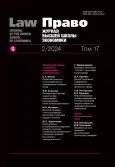Information Bases of Modern Criminal Law Protecting Subjects of Digital Economy and Finance
- 作者: Rastoropov S.1, Prorvich V.1
-
隶属关系:
- National Research University Higher School of Economics
- 期: 卷 17, 编号 2 (2024)
- 页面: 143-169
- 栏目: Russian Law: Condition, Perspectives, Commentaries
- URL: https://journal-vniispk.ru/2072-8166/article/view/317741
- DOI: https://doi.org/10.17323/2072-8166.2024.2.143.169
- ID: 317741
如何引用文章
全文:
详细
作者简介
S. Rastoropov
National Research University Higher School of Economics
Email: srastoropov@hse.ru
ORCID iD: 0009-0005-8105-4514
V. Prorvich
National Research University Higher School of Economics
Email: kse60@mail.ru
参考
- Abdulvaliev A.F. et al. (2021) Crimes using information technology: qualification and features of investigation. Tyumen: University Press, 376 p. (in Russ.)
- Bychkov V.V. (2022) Conceptual, strategic and doctrinal basis of legislative counteraction in Russia to extremist criminals using information and telecommunication networks. Zhurnal chastnogo i publichnogo prava=Ius Publicum et Privatum, no. 1, pp. 166-173 (in Russ.)
- Efimova L.G. (2020) Sources of legal regulation of public relations in cyberspace. LexRussica, no. 3, pp. 114-120 (in Russ.)
- Gaukhman L.D. (2013) Qualification of crimes: law, theory, practice. Moscow: Yurinfor, 543 p. (in Russ.)
- Golovko L.V. et al. (2016) The course of criminal procedure. Moscow: Statut, 657 p. (in Russ.)
- Lapin V.O. (2022) Theoretical basics of investigation in the field of entrepreneurial activity. Moscow: Yurlitinform, 360 p. (in Russ.)
- Luzgin I.M. (1981) Modeling investigation of crimes. Moscow: Juridicheskaya literatura, 152 p. (in Russ.)
- Maksimov S.V. et al. (2018) Digital criminology as a tool for combating organized crime. Rossiyskiy kriminologicheskiy zhurnal=Russian Journal of Criminology, no. 4, pp. 476-483 (in Russ.)
- Opalsky A.P. et al. (2022) Lessons from the combating market manipulation: a manual. Moscow: Alpen-Print, 100 p. (in Russ.)
- Romanovsky M.Yu., Romanovsky Yu.M. (2020) Mathematical principles of economophysics: a manual. Moscow: Institute of Computer Research, 360 p. (in Russ.)
- Savenko N.E. (2023) Legaltech in the digital economy and legal regulation of economic activity of citizens. Pravo. Zhurnal Vysshey shkoly ekonomiki=Law. Journal of the Higher School of Economics, vol. 16, no. 1, pp. 145-171 (in Russ.)
- Shmonin A.V. (2017) Trends in forensic decision-making algorithms in criminal proceedings.Trudy akademii upravlenia MVD=Works of the Academy of Management of Internal Ministry, no. 4, pp. 73-77 (in Russ.)
- Talalina E.V. (2022) Data processing using artificial intelligence and the risks of discrimination. Pravo. Zhurnal Vysshey shkoly ekonomiki=Law. Journal of the Higher School of Economics, vol. 15, no. 1, pp. 4-27 (in Russ.)
- Timoshenko A.A., Feyzov V.R., Chernov I.V. (2023) Scenario approach to the study of regulation in the field of cryptocurrencies in Russia. Rossiyskiy zhurnal pravovykh issledovaniy=Russian Journal of Legal Studies, no. 2, pp. 21-30 (in Russ.)
- Yankovsky R.M. (2020) Cryptocurrencies in Russian Law: Surrogates, “other property” and digital money. Pravo. Journal Vysshey shkoly ekonomiki=Law. Journal of the Higher School of Economics, vol. 14, no. 4, pp. 43-77 (in Russ.)
- Zhdanov Yu.N., Ovchinsky V.S. (2020) Cyberpolice of the 21th century: international experience. Moscow: Mezhdunarodnye otnoshenia, 288 p. (in Russ.)
补充文件








